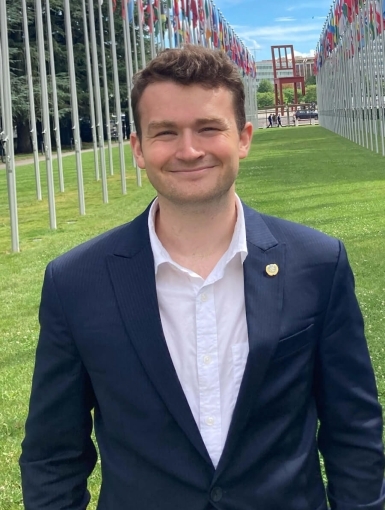
Graham Dilworth MPP ’23, a Career Resources Center fellow at the Agahozo Shalom Youth Village (ASYV) in Rwanda, has spent the start of his career working in international development policy. At the ASYV, he works closely with youth from vulnerable backgrounds, guiding them in career development and furthering their education. His experience also includes aiding in refugee resettlement and teaching English to displaced Syrian and Yemeni teens.
Previously, Dilworth’s time at the United Nations Institute for Training and Research in Geneva, Switzerland focusing on capacity-building for government workers from low and middle-income nations helped to fuel his interest in post-conflict growth, transitional justice and peacebuilding. Building on his experience and inspired by Rwanda’s progress in healing weaponized hatred stemming from the 1994 genocide against the Tutsi, where children of genocide victims now forge friendships with children of perpetrators and killers, Dilworth prepares for an upcoming move to the Balkans.
Distinguishing himself among more than 3,000 applicants, Dilworth was awarded a prestigious Catholic Relief Services International Development Fellowship, where he will continue his work in international development in Bosnia and Herzegovina countering ethnonationalism, recognizing the challenges but remaining optimistic about peace and healing.
“In Bosnia and Herzegovina and many other countries in the Balkans, the scars of the 1990s are much more apparent and healing has been less successful,” shared Dilworth, explaining that international borders and intricate diplomatic ties among nations have restricted inter-ethnic communication and perpetuated tensions. Despite these complexities, he remains optimistic. “This is a complicated environment where the lessons I bring from Rwanda may not always apply. Still, I come to the country with a clear lesson: peace and healing are possible.”
Dilworth recalled Professor Betty Duke, in one of her classes, proclaiming, “Nobody wakes up in the morning and wonders how they are going to successfully be a villain.” Highlighting the impact of Duke’s words, he emphasized the importance of taking strong moral stances against injustices and understanding the underlying motivations and beliefs of all parties in a conflict.
“As humans, we have the urge to view members of a conflict in a binary way, as good and bad,” said Dilworth. Reflecting on his experience working closely with the Center for International and Security Studies at Maryland (CISSM), he emphasized how classes taught by Professors Nancy Gallagher and Josh Shifrinson challenged such notions and helped students to understand the perspectives of those with whom they disagreed.
“The research paper on the future of U.N. peacekeeping that Graham wrote for my Cooperative Security, Arms Control, and Nonproliferation seminar exemplified his ability to take a complex problem about which most people are totally pessimistic, analyze it from the perspective of each major player and identify policy options that could be acceptable to all of them,” said CISSM Director Gallagher.
As Dilworth prepares for his CRS journey, he will bring with him the importance of understanding all sides in a conflict, an invaluable lesson learned through his international security policy studies at the School of Public Policy. Offering advice to aspiring changemakers, Dilworth noted, “Professional opportunities are incremental. It is incredibly important to stay motivated when the opportunities available to you are tangential to what you want. … Often, the opportunities that you least expect are the ones that open doors.”




